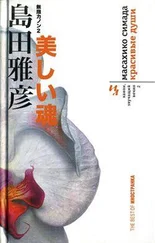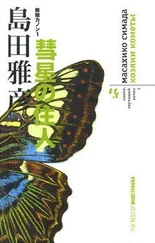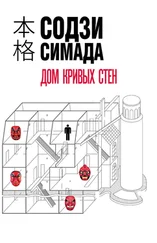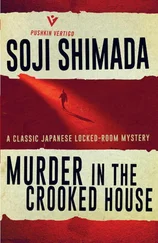He had slept with his mother since the first week after his birth. It was hot in summer, but in winter she held him close, his warm body like sleeping with a hot water bottle. How many times a day had she kissed those smooth cheeks? And now, suddenly she found herself lying there without him, unable to sleep. He smelt of saliva, and of urine. Sometimes he’d kick her in the stomach, or climb onto her face, but now that she couldn’t hear his sleeping breath she felt she never slept. It was more than a year since he’d died, but still her hands went out to find him in bed. Then she’d realize he wasn’t there, an empty sorrow would overcome her, and she’d weep into the pillow. Night and day she thought about him. It was just as if she’d lost her own arm or leg. Like reaching out as usual to turn off the alarm, and finding she didn’t have an arm. And though the arm was gone, it was still part of her consciousness. That’s how it felt. He was dead, but she felt as if he was simply hiding around some corner. Even now it felt as if she could turn around and find Shingo sitting there. When she was in the house and heard a sound, she’d find herself going to check. Maybe he’s playing alone in the playroom, she’d think, maybe he’s suddenly come back from the dead. She often heard things. Mummy, I’ve finished, she’d hear him say – he’d always announced this loudly when he’d finished on the potty. Mummy, I want some milk; Mummy, please read to me; Mummy, I want some potato; Where are you Mummy? His voice would suddenly come to her. Whenever the intercom sounded, she’d hear his footsteps running down the corridor. “Super hyper bomber kick!” or “Squeak squeak said the samurai rat,” he’d call.
Shingo was part of his mother’s body – he’d been inside it once, after all. Since the day he died, she’d been only half alive. Her life was paired with his as a single entity. They had slept and woken together, she’d eaten with him, laughed with him, cried with him. Shingo loved pork cutlets, and they often went to the Bodaiju Restaurant in Futako Tamagawa for a fillet set course. He’d devour an adult serving, then eat his mother’s ice cream as well. He refused to eat a balanced diet. Usually all he’d eat was white rice and fruit. The only fish he’d eat was raw tuna and sake-dried mackerel. He also like fermented soybeans, with lots of seaweed flakes sprinkled over it, so that his face became coated in bits of seaweed when he ate it. He’d looked forward to learning piano when he turned five, but this was never to be. His father had promised to take him to Okinawa on his fifth birthday.
She wanted to go back to the days when Shingo was alive. She felt she must have been too happy then, that’s why it had happened. Those five years since she’d parted from Kita were probably the happiest in her whole life. Her husband was kind. He didn’t try to hold her back, he let her come and go as she wanted, and he left the decorating of their new house and the designing of the garden up to her. She’d got catalogues from Italy and England, and chosen wallpaper and curtains and tiles to suit her own taste, and taken her time to create the home. His family put up all the money for it. Since Shingo was born, her husband’s mother had come every day and helped with the housework, so it had all been quite easy. There was no friction between them. Her husband was good about cooking and cleaning up, he loved his wife, he was always getting back from work past midnight but it didn’t bother her. If a man has to deal with children, his maternal instincts come out. Her husband was good at teaching Shingo words and numbers. He’d tug at his own ears and say playfully “I’m Mr Spock,” or put on glasses and wrap a yellow scarf around himself like a robe and say “I’m the Dalai Lama.” If you asked what time it was he’d look at the clock and think, then say things like “It’s seventy three minutes past three.”
What would Shingo have become when he grew up? she wondered.
He’d said he wanted to be a conductor. When some orchestral music began on the television or video, he’d stand on the sofa and conduct. There had been so many possible futures, if he’d just lived. He’d have started elementary school next April. She’d always have similar thoughts whenever a new phase in his life would have begun, she knew. If he was alive now, he’d have reached this or that stage in his piano training, she’d think; or, I wish I’d taken him to view autumn leaves while he was alive; or, he’d be coming back all caked in mud from a football match. But she also thought that perhaps unspeakable things would have happened in his future, so maybe it was better that he wasn’t alive. There was bullying when you reached adolescence, and maybe he would have got depressed and committed suicide. The world was less and less safe, and he couldn’t have hoped to live the luxurious life of an earlier era. He’d escaped all that unhappiness, so perhaps he’d gained something by dying so young. After all, everyone dies, don’t they? The only difference is whether it happens early or late.
Put that way it sounded harsh, she knew. But she couldn’t bear to say it any other way. Since Shingo’s death, problems had arisen between her and her husband. The two of them had been united as a couple because of their son. Her husband seemed to be seeing some other woman. She could tell. He was smart, so he was careful to get rid of all the evidence before he came home, but his constant brightness and carefree air was because he was having a relationship with someone healthy. She herself had developed this nervous disorder since Shingo’s death, and could no longer smile. He never made the slightest attempt to look at her. If she left home, he’d doubtless go right on working as usual, and calling in on this other woman. But she wasn’t going to divorce. Why should she do him that favour? This house belonged to Shingo and his mummy. And Shingo wouldn’t want daddy not to be there. He loved his daddy. As for his daddy, he was a typical bureaucrat. He’d dealt with the pain early on, and simply said now that all the grieving in the world wasn’t going to bring the boy back. You had to forget the painful things as soon as possible or it would affect your work, he said. Try your hardest to consider how best to distribute the nation’s tax. You can change your mood by doing money calculations. But she couldn’t do that. Her job had been to bring up Shingo. She’d lost both him and her job. No, it was truer to say that she was still carefully looking after him. Inside her that’s what she was doing. He continued to grow inside her mind. She often dreamed of him. The Shingo of her dreams spoke with a strangely adult voice. Don’t be too sad, mummy, he said, you’ll make me want to cry too. Just recently she’d dreamed he walked in the door as a young man, announcing he’d come home. Where’ve you been? she asked. I’ve been worrying about you. I’ve been travelling round the world, he announced. I’ve seen the Iguazú Falls, and Niagara, and I’ve walked in the Sahara. When she wept in her dream to see he was alive, he comforted her. I’m sorry, he said, I didn’t want to die either, but I had to go, God had some business with me. I’ll come back now and then, so please have a pork cutlet cooked waiting for me. These dreams were very painful for her. She felt he must feel most at home when he was in her dream. It was only his mother or father who could dream of him like this. And his father’s head was full of money and another woman, so it was her responsibility. If she didn’t welcome him back in her dreams, he’d have nowhere in this world to exist any more. That would be too sad for him, so she’d decided to keep on living despite the pain.
Mizuho paused at this point, took a handkerchief from her handbag, and wiped the tears that flowed from her eyes beneath the sunglasses. Then she handed Kita a snapshot in a plastic cover, of her son as he had once been. He was a long-lashed boy. He was eating an ice cream, a white creamy moustache around his mouth. He didn’t strike Kita as some unknown child. He was the child of Kita’s former lover, and when Kita told himself this boy was no longer in this world, he felt an urge to at least look after the boy in the next. He also wished he could do something for this mother who had grieved so much this past year. Could he help in some way? he asked her. She shook her head silently.
Читать дальше












